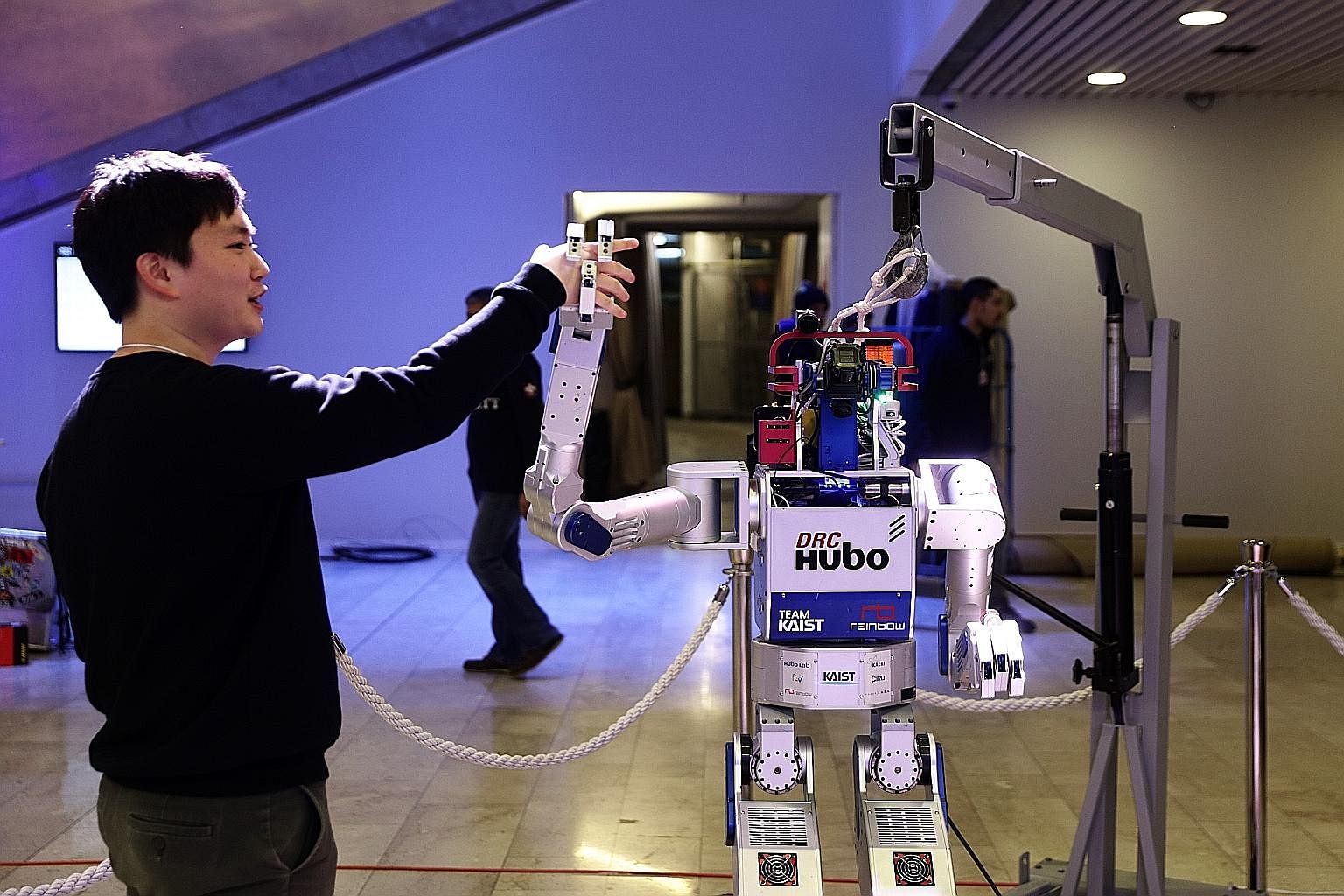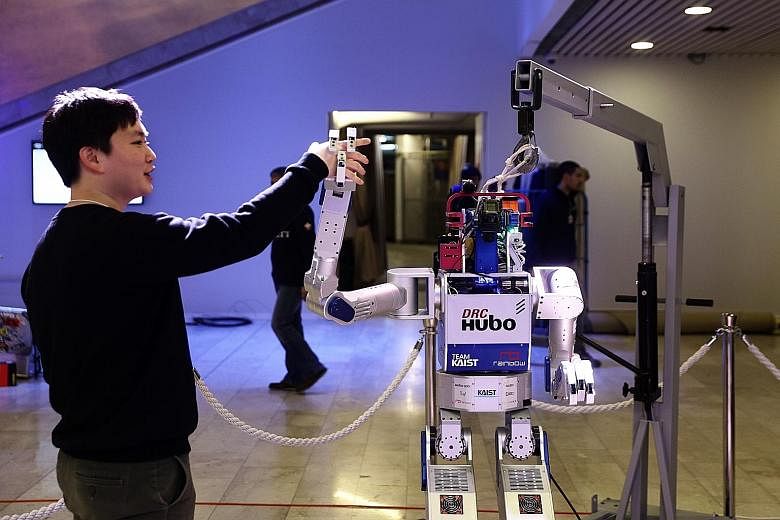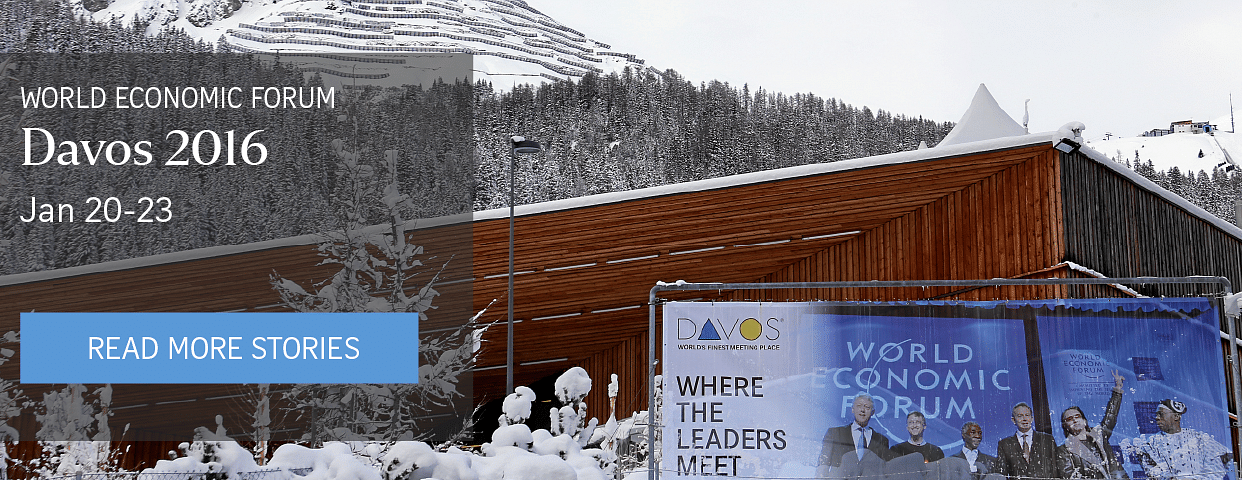DAVOS (Switzerland) • A young woman, dressed in black and luminous yellow running gear, is pounding the treadmill in a glass-walled pavilion along the Promenade, the main street in the Swiss Alpine resort of Davos.
It is a striking sight, amid the other more conventional shopfronts, and also as this is hardly the weather for running, with temperatures having dipped as low as minus 12 deg C last week.
Not surprisingly, several business and political leaders here for the World Economic Forum (WEF) meeting are drawn to the Technogym pavilion.
The fitness equipment-maker is promoting its latest "Wellness on the Go" line, and these are no ordinary machines for mindlessly burning away the calories.
Rather, the state-of-the-art runners are able to connect to the Cloud to pull up details of your training regime and records, anywhere in the world.
They can link to your training watch or other wearable device, and, given the frigid weather outside, you could also ask the machines to replicate your usual running route, be it at the Botanic Gardens in Singapore or Central Park in New York.

Welcome to the Internet of Things. This is the fast-unfolding world where all manner of devices connect and communicate among themselves, allowing users to command and control them remotely via the Internet.
In this new world, Technogym is no longer just a producer of exercise machines.
It is a wellness company that uses the latest technology to provide health services to enhance the well-being of its well-toned, hard-charging customers, including some of the 2,500 participants at the WEF's annual meeting.
Others, too, are rushing ahead to this future. CEOs of traditional companies, like American healthcare group Kaiser Permanente, shared at the forum their work on programmes such as Doctor Care Anywhere, which allows patients to consult doctors virtually.
Alcoa, better known as a producer of metal products, dwelled on its plans to invest in 3D printing techniques and materials.
Doing so will keep them in the game even as demand and technology shift, they say.
The impact of the rapid advances in fields like 3D printing, artificial intelligence, nanotechnology, robotics and the Internet of Things is giving rise to what has been dubbed the Fourth Industrial Revolution by Professor Klaus Schwab, the WEF's founder and executive chairman, in his new book, a copy of which was given to all participants as pre-reading on the theme for this year's annual confab.
"The First Industrial Revolution used water and steam power to mechanise production.
"The Second used electric power to create mass production.
"The Third used electronics and information technology to automate production.
"Now a Fourth Industrial Revolution is building on the Third, the digital revolution that has been occurring since the middle of the last century.
"It is characterised by a fusion of technologies that is blurring the lines between the physical, digital and biological spheres.
"The speed of current breakthroughs has no historical precedent.
"When compared with previous industrial revolutions, the Fourth is developing at an exponential rate rather than a linear pace.
"Moreover, it is disrupting almost every industry in every country.
"And the breadth and depth of these changes herald the transformation of entire systems of production, management and governance," wrote Prof Schwab.
Proof of these new technologies coming rapidly on stream was evident throughout the massive WEF conference centre, from a South Korean robot called Hubo showing off its dexterity in navigating obstacles in its path, to virtual-reality documentaries and an exhibition called This Time Tomorrow which showcased futuristic products, such as clothes with solar panels to charge your mobile phone.
It is a world of rich new possibilities.
Indeed, one speaker at the forum, Oxford professor of globalisation and development Ian Goldin, likened the present to the Renaissance, with its flourishing of science, innovation, the arts and ideas by the likes of Michelangelo and Leonardo da Vinci.
Such periods of intellectual ferment, added Professor Patrick McCray, professor of history at the University of California, often result in upheavals in society, with new social systems and operating standards emerging, from education to religion and social welfare.
But today, it is the sheer scale and pace of change that is proving bewildering to many.
As United States Vice-President Joe Biden pointed out, there are very real middle-class fears of jobs being lost, livelihoods being disrupted and communities being shattered.
Indeed, a report released just days before the forum by the WEF warned that as many as seven million jobs in developed countries could be lost over the next five years, with only two million new ones created over the same period.
The "Uberisation" of the economy might threaten cabbies' livelihoods, as private drivers offer cheap and convenient rides to passengers.
But even those private drivers might be made redundant when an Uber of the not-too-distant future starts offering rides in driverless vehicles.
Then what?
A POST-WORK WORLD
Judging by the discussion in Davos, there seems to be at least two distinct camps on what one might make of the prospect of a world without work.
The "techno-optimists" cite the amusing mantra of science fiction writer Arthur C. Clarke, that the "goal of the future is full unemployment, so we can play".
New and more meaningful forms of human activity and social support networks will spring up in this brave new world, just as it happened in the previous industrial revolutions.
Just imagine, this group says, robots that can not only take away the drudgery of office work, but also look after Ebola patients or handle nuclear waste.
The opposing camp's rejoinder is from French philosopher Voltaire, who argued that "work banishes three great evils - boredom, vice and need". Already, signs of all three are evident in some societies, they note.
Unemployment levels are high in many developed countries, including among young people. Yet, paradoxically, employers speaking on a panel discussion on the Future of Jobs were united in lamenting how difficult it was to find, and hold on to, the skilled workers they need.
Employers pointed to a double mismatch - skilled workers were not where the jobs were; they were reluctant or unable to move, with national borders, cultural differences or xenophobic attitudes acting as barriers.
Secondly, workers who were available did not have the skills that employers sought.
Just about everyone who spoke at the session agreed that the main reason for this was outmoded education systems in most countries.
Taking up these issues, Deputy Prime Minister Tharman Shanmugaratnam, who participated in several panel discussions and meetings on the subject of the future of jobs and manufacturing with top business and political leaders, pointed to two major fears over the so-called Fourth Industrial Revolution.
"First, that it could destroy jobs, and does not create enough new jobs… That is a valid fear, as it could happen that way," he noted.
But what had to be feared even more, he argued, was the status quo. This was one of high unemployment in many countries, coupled with jobs going unfilled because of a mismatch of skills to jobs. Wages had also stagnated for the middle classes, such that the current situation holds little promise for many ordinary folk.
"We should fear the failure of the Fourth Industrial Revolution, that it fails to uplift productivity, because you can only raise wages on a sustained basis if you go for higher levels of productivity," he argued.
Instead of these scenarios, he held out a third option, saying: "The challenge is to prepare people for this new world, where you already have many jobs unfilled, to prepare them for these jobs, and the jobs that are coming as well."
Doing so would require a reorientation in the way people are prepared for work and for fulfilling their potential, said the DPM.
First, a new balance has to be struck between the practical and theoretical in education programmes.
A shift is also needed away from the front-loading of education during the first two decades of a person's life towards a system of lifelong learning.
Public funds, and private savings, which tend to be focused on education in these early years, should be spread out over a longer period of a worker's lifetime, enabling him to continually retool for new jobs as technologies change.
To be more effective, education institutions should do better at measuring outcomes, ensuring that they are preparing their young charges for the jobs that are coming on stream.
Getting employers and unions more involved in shaping curricula and programmes would also ensure that education programmes are agile and stay relevant amid rapid changes in technology.
These steps are precisely what the Singapore Government has embarked on with its new SkillsFuture programme, he added.
Rejecting the talk of a robotised future world plagued with massive unemployment, he said: "Technology will not determine the future. It is we who will make the future. The question is how we adapt."
Sharing this view, Prof Schwab summed up the current situation as a moment of "great promise, but also great peril".
RUNNING ON THE SPOT INTO THE FUTURE
As I left the Technogym's glass pavilion, I turned to glance at the young woman on the treadmill.
To some, it might seem that she is running on the spot, going nowhere amid the frosty Davos winds of change.
Yet, with a bit of imagination, you might also see another, more optimistic, scenario.
By embracing change and running with it, she and her savvy employers are turning a simple treadmill into a desirable techno-wellness gadget of the future, and striving to make sure they have a place in it.
- Read more stories on the summit online at http://str.sg/ZVgM



